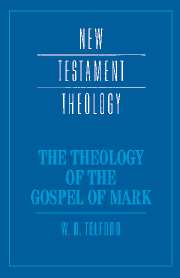4 - Mark in the church and in the world
Published online by Cambridge University Press: 05 June 2012
Summary
MARK IN HISTORY
Having discussed the place of Mark's theology in the New Testament, it now remains for me to make some concluding remarks not only on the place of Mark in history but also on its relevance for the contemporary world. Although it is clear to us today that Mark's contribution to the theological history of Christianity has been a not inconsiderable one, the value attached to the Gospel both by the church and by the academy over the centuries may be described as ambiguous. On the one hand, its use as a source (albeit with modifications) by Matthew and Luke in the first century, as well as by Tatian (in the composition of his Diatessaron, c. 170 ce) in the second, its traditional connection with the apostle Peter in the early second century, and its designation as one of the four pillars of the church by Irenaeus later that century, are all factors which attest its significance for the early church. On the other hand, quotations from the Gospel of Mark are relatively uncommon among second-century writers, and commentaries on or expositions of the Second Gospel even more so. It was not until the fifth century indeed that the first of these (by Victor of Antioch) appeared. Apart from that of Bede in the eighth century, and certain medieval and post-Reformation expositions, there were few treatments of the Second Gospel in subsequent centuries to rival those devoted to the other Gospels.
- Type
- Chapter
- Information
- The Theology of the Gospel of Mark , pp. 214 - 241Publisher: Cambridge University PressPrint publication year: 1999



